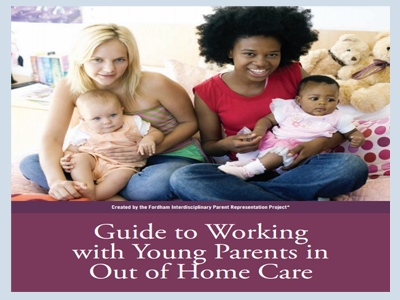The Guide to Working with Young Parents in Out of Home Care provides information and guidance for working with pregnant and parenting youth that are central to appropriate service delivery and the Family Team Conference practice model.
The focus of this guide is to provide support to young pregnant and parenting youth, helping them as they develop both as individuals and as parents through positive casework interactions.
The Guide encourages a strengths-based approach to ensure the safety of both young parents and their children. It offers suggestions for engaging young parents in conferencing and supportive services while highlighting the importance of maintaining a young parent’s right to privacy and autonomy, and emphasize comprehensive planning for pregnant young people to promote well being, to minimize the need for court intervention, to ensure placement stability and to help young families move more quickly toward permanency.
The Guide is designed to be used primarily by provider agency case planners, but may also be useful to child protective staff, Family Services Unit staff, parent advocates, attorneys and others who work with this vulnerable population.
While there are many references to young mothers throughout the document, we recognize the importance of engaging young fathers, as appropriate, in planning and caring for their children. The Guide includes a section entitled “Involving Fathers” and lists some resources for fathers in the Appendix.
Other family members or members of a young parent’s support network may also be instrumental in supporting the young parent from childhood or adolescence into adulthood. While many young parents and their children reside in group settings, it is generally preferable for young parents to reside in family settings. Family settings may be foster homes but may also be homes of close family or friends that young parents and their children are released to or directly placed in by the Family Court.
The term “resource parent” appears in this Guide in place of “foster parent.” Case planners and others working with pregnant or parenting young people should also be mindful that lesbian, gay, and bisexual young people experience higher rates of pregnancy than their heterosexual peers. It should not be assumed that a young person identifies as heterosexual simply because he or she is pregnant or parenting. As with all casework practice, services provided to pregnant or parenting lesbian, gay, bisexual, transgender or questioning (LGBTQ) young people should be designed to address their particular needs as parents, and should be provided in a culturally competent manner.
The Guide should be read in its entirety and used as both a training tool and a reference guide as it includes a variety of resources that may be useful in individual cases.
Download your Copy of the Guide to Working with Young Parents in Out of Home Care

